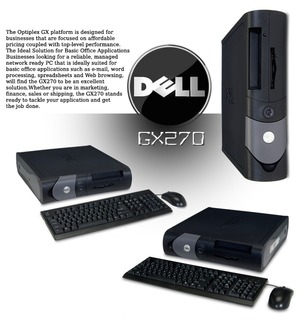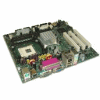Wednesday
Jul072010
Why What’s Happening to Dell Won’t Happen to Apple
 Wednesday, July 7, 2010 at 1:41PM
Wednesday, July 7, 2010 at 1:41PM  Businesses bought these in drovesIt's been nearly five years since Dell built the last Optiplex GX-270. Five years since the last of the substandard batch(es) of capacitors made their way into the motherboards of one of the most popular business platforms produced to date. That it has taken this long for Dell's mistake to come to light speaks volumes about their efforts to sweep the issue under the rug. Considering they made 11 million faulty Optiplex machines, Dell must have found a huge rug and used a very big broom! If even half of recent allegations are true, their moxie is only exceeded by their deviousness.
Businesses bought these in drovesIt's been nearly five years since Dell built the last Optiplex GX-270. Five years since the last of the substandard batch(es) of capacitors made their way into the motherboards of one of the most popular business platforms produced to date. That it has taken this long for Dell's mistake to come to light speaks volumes about their efforts to sweep the issue under the rug. Considering they made 11 million faulty Optiplex machines, Dell must have found a huge rug and used a very big broom! If even half of recent allegations are true, their moxie is only exceeded by their deviousness.I have some personal insight into this ongoing saga. During my eight year stint as the IT manager of a medium-sized site, I dealt with Dell almost exclusively. They were my primary hardware supplier for servers, desktops and peripherals and typically consumed over 90% of my annual hardware budget. From mid-2004 through early 2005, the GX-270 was my desktop configuration of choice and I purchased over 30 of them. Early in 2006, we felt the first twinge of what would become a very painful experience. One of my more discriminating users called to inform us that his computer had simply ”blinked off” without so much as an error message or freeze-up. The machine never ran again until the motherboard was replaced. As I recall, we spent a considerable amount of time on the phone with Dell's support folks before determining the problem, but once they diagnosed it, their on-site support team had the machine repaired with a new motherboard in a day or two. At that early point, I think neither we nor they had any idea of what was to come.
We experienced three identical failures within the following 90 days, all of which occurred on GX-270s. By then it was apparent Dell had built a stinker and our troubleshooting steps were reduced to simply opening the case of the dead machine to verify swollen or ruptured capacitors on the motherboard. We never experienced any deception or denial by Dell's support team. In fact, after another six months or so, Dell issued a motherboard replacement “recall” of all Optiplex GX-270 machines. I use quotes around “recall” because some customers simply got replacement boards and others got on-site replacement service depending on their individual support agreements. In either case, it seemed to me Dell was owning up to the defects, but I was a relatively tiny customer compared to the schools and companies reportedly left holding a bag full of hundreds or thousands of bad machines. I guess court cases will decide just how forthright they truly were. Eventually, all but two of the 270s I bought suffered the same fate, some of them twice. This confirms Dell replaced the faulty motherboards with more faulty motherboards.

To me, this incident is only a symptom of a much greater malady, one I doubt we've seen the last of. Dell was simply the first company to fall victim. Tough competition in the computer market has turned PCs into commodity items and Dell is, in many ways, a major contributor to that trend. Their innovative supply-chain management, automated order and inventory systems, and streamlined manufacturing techniques have become the models studied by business schools everywhere. The last decade, however, has seen the rest of the industry catch up to Dell's efficiencies causing a great deal of pressure on all PC manufacturers to find cost savings elsewhere. When these computer makers could find no more means of cost reduction within their own companies, the pressure shifted to component suppliers like the Chinese company that supplied Dell with millions of faulty capacitors. Commodity parts like resistors and capacitors have long been manufactured overseas, where labor costs are a fraction of what they are here, but we've never seen a quality problem of this magnitude. I'm reminded of the cliché, "You get what you pay for.” Our insatiable desire for cheap electronics has driven most manufacturing overseas and that's not going to change any time soon. It all comes down to a cost/benefit analysis for companies like Dell. This incident won't be cheap, but I don't think Chinese manufacturing is in any danger of banishment as a result. In a business where margins are typically 5% or less, PC manufacturers certainly can't afford more expensive domestically produced components but I'll bet they're all reconsidering their overseas supplier selection process.
So what does this have to do with Apple? They’re doing the same thing Dell, HP and a host of other computer makers are doing, right? Their biggest manufacturing partner is Foxconn, a Chinese company, isn’t it? Yes, Apple uses Chinese manufacturers for almost everything they sell. The big difference between them and every other computer maker is Apple operates at over a 35% margin. They have astutely differentiated themselves as a “luxury” brand and command higher prices for their computers, MP3 players, phones and virtually everything with their logo on it. They’ve been able to do this because of their superior design, engineering and marketing right here in the USA (California). Additionally, Steve Jobs made a very smart decision upon his return to Apple in 1997. He stopped the practice of licensing Apple technology to third parties and made all Apple products proprietary. The net effect was (and is) complete control of every product Apple designed, from operating systems to hardware. From that point forward, if you wanted any Apple product, you had to buy it from Apple or one of its resellers and Apple software would only run on Apple hardware. More importantly, it gave Apple complete control of the entire user experience, including price. This gave them the ability to mold the Apple brand to their liking. Obviously, their “Think Different” philosophy has paid off. Their success is evidence that people will pay extra for what they believe is a superior product.
Apple cofounder and inventor of the first Apple computer, Steve Wozniak’s famous quote, “I don’t want to be remembered for inventing the first personal computer, I want to be remembered for inventing the first good one.” embodies a philosophy still followed at Apple today... and it’s working well for them.
With such large margins, Apple suppliers probably aren’t under as much price pressure as suppliers for other PC makers. The problem Dell is now facing probably stemmed from a decision to save a buck or two per computer. With little or no differentiation from other PC makers, Dell is embroiled in a price war with them all. Saving a few million dollars by selecting a cheaper capacitor provider may have seemed like a good decision at the time. You can bet, before this is over it will cost them several times that. Hopefully, we Apple fans won't suffer the same fate as Dell's customers because we're “getting what we paid for.”



